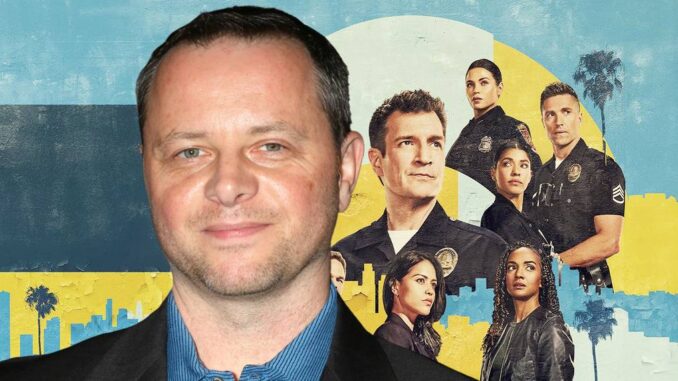
The Rookie Showrunner on the Real Consequences of Chenford’s Split and Aaron’s Comeback
The air in the writers’ room still hums with the phantom echoes of impassioned arguments and late-night caffeine-fueled epiphanies. As the “rookie showrunner,” a title that feels both absurdly grand and utterly terrifying, I often find myself staring at the whiteboards, seeing not just plot points but the swirling vortex of fan expectation, network demands, and the fragile, beautiful lives of our characters. This past season, two seismic events, polar opposites in their emotional resonance, defined my tenure: the gut-wrenching decision to split Chenford, and the miraculous, hard-won return of Aaron Thorsen. Both had consequences far beyond the page, rippling through the show’s very DNA.
Let's talk about Chenford. Oh, Chenford. The love story that launched a thousand fanfictions and countless tweets. When we floated the idea of Lucy and Tim breaking up, the silence in the room was deafening, followed by a collective wince. It was a creative act of violence, a surgical cut, and believe me, it hurt us as much as it hurt the audience. The real consequences, however, weren't just the immediate tidal wave of fan outcry – the indignant emails, the all-caps tweets, the heartfelt pleas to reconsider. Those were predictable, though no less jarring to experience firsthand. No, the real consequence was the profound shift in the show’s emotional landscape.
Before the split, Chenford was a warm, comforting hearth in the series, providing reliable banter, romantic tension, and a sense of "happily ever after" for two beloved characters. Their breakup, born from the very realistic friction of Tim’s lingering trauma and Lucy’s soaring ambition, shattered that comfort. Suddenly, Lucy Chen, our optimistic, driven rookie, was navigating the raw pain of heartbreak while simultaneously reaching for her career dreams in UC. She became sharper, more guarded, yet also more fiercely independent. We saw her vulnerability in new, profound ways, forced to stand on her own two feet without the immediate safety net of Tim. This wasn’t just a breakup; it was a crucible for her character, forging a steelier, more complex Lucy.
And Tim. My God, Tim Bradford. The consequence for him was an identity crisis. His entire framework had been built around control, responsibility, and the unspoken weight of his past. With Lucy gone, that structure crumbled. He became adrift, irritable, and genuinely lost, struggling to find a new footing professionally and personally. His arc wasn’t about finding a new love interest immediately; it was about the slow, painful process of rediscovering who Tim Bradford was without Lucy. The show lost a bit of its lighthearted romance, yes, but it gained a gritty, often uncomfortable, emotional realism. We leaned into the awkward silences, the strained glances, the quiet ache of two people who still loved each other but couldn't make it work. It was messy, it was real, and it opened up a myriad of new, darker shades for characters we thought we knew. The consequence was a show that, for a time, felt a little more grown-up, a little more grounded in the complexities of adult relationships.
In stark contrast to this intentional, painful dissection was the harrowing, unplanned ordeal of Aaron Thorsen. His shooting was a gut punch, a reminder of the ever-present danger that lurks in our world. As a showrunner, watching a character you helped create fight for his life on screen, knowing the actor's vulnerability and talent were on full display, was a unique kind of terror. But the real consequence of Aaron’s attack and subsequent comeback was not just the palpable relief we all felt when he survived; it was the re-calibration of the show’s very heart.
Aaron’s recovery wasn’t a magic bullet; it was a slow, arduous crawl back from the brink. We deliberately showed the physical therapy, the mental scars, the PTSD, the lingering fear. His comeback wasn't just about him rejoining the force; it was about the resilience of the human spirit. For the other characters, Aaron's return was a stark reminder of their own mortality, deepening their bonds and infusing every patrol with a renewed sense of purpose and caution. Nolan, as his training officer, carried a unique burden of responsibility and guilt, and Aaron's recovery allowed for a powerful exploration of their unique, familial bond.
But the most profound consequence of Aaron's comeback was the injection of hope and triumph back into a season that, with Chenford's split, felt heavier than usual. Where Chenford showed us the painful reality of loss and separation, Aaron’s journey illustrated the power of healing, community, and the will to live. He became a beacon, a living testament that even after being shattered, one could put the pieces back together, albeit in a different shape. His quiet strength, his determination to reclaim his life, resonated deeply. It reminded us that while relationships can fail, and dreams can be deferred, the human capacity for recovery is boundless.
So, here I sit, surrounded by the remnants of this season. Chenford's split was an act of necessary destruction for growth, a decision that brought pain but also a raw, honest depth. Aaron’s comeback was a phoenix from the ashes, a testament to resilience that uplifted the entire narrative. As a rookie showrunner, I’ve learned that the "real consequences" aren't just about shocking twists or fan engagement. They are about the subtle, profound shifts in character, the evolving tone of the show, and the quiet, almost invisible ways these stories reflect the beautiful, messy, devastating, and ultimately hopeful tapestry of real life. It’s a tightrope walk, and I’m just trying not to look down.